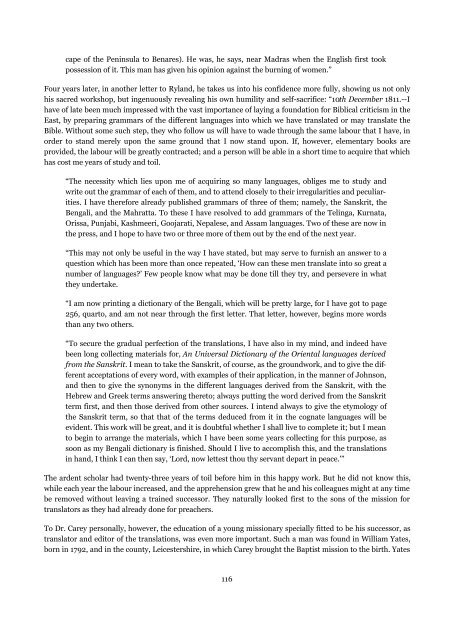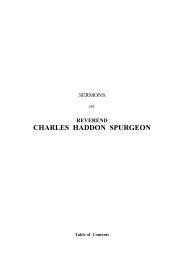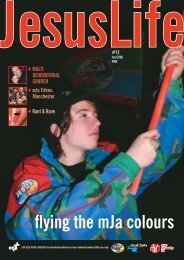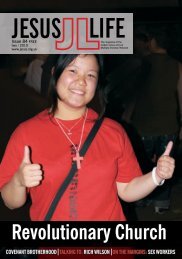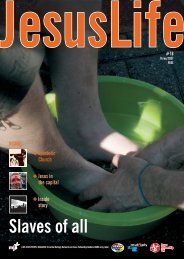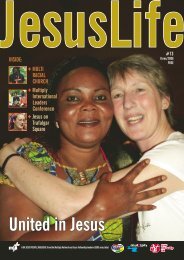Life of William Carey by George Smith - The Jesus Army
Life of William Carey by George Smith - The Jesus Army
Life of William Carey by George Smith - The Jesus Army
You also want an ePaper? Increase the reach of your titles
YUMPU automatically turns print PDFs into web optimized ePapers that Google loves.
cape <strong>of</strong> the Peninsula to Benares). He was, he says, near Madras when the English first took<br />
possession <strong>of</strong> it. This man has given his opinion against the burning <strong>of</strong> women.”<br />
Four years later, in another letter to Ryland, he takes us into his confidence more fully, showing us not only<br />
his sacred workshop, but ingenuously revealing his own humility and self-sacrifice: “10th December 1811.--I<br />
have <strong>of</strong> late been much impressed with the vast importance <strong>of</strong> laying a foundation for Biblical criticism in the<br />
East, <strong>by</strong> preparing grammars <strong>of</strong> the different languages into which we have translated or may translate the<br />
Bible. Without some such step, they who follow us will have to wade through the same labour that I have, in<br />
order to stand merely upon the same ground that I now stand upon. If, however, elementary books are<br />
provided, the labour will be greatly contracted; and a person will be able in a short time to acquire that which<br />
has cost me years <strong>of</strong> study and toil.<br />
“<strong>The</strong> necessity which lies upon me <strong>of</strong> acquiring so many languages, obliges me to study and<br />
write out the grammar <strong>of</strong> each <strong>of</strong> them, and to attend closely to their irregularities and peculiarities.<br />
I have therefore already published grammars <strong>of</strong> three <strong>of</strong> them; namely, the Sanskrit, the<br />
Bengali, and the Mahratta. To these I have resolved to add grammars <strong>of</strong> the Telinga, Kurnata,<br />
Orissa, Punjabi, Kashmeeri, Goojarati, Nepalese, and Assam languages. Two <strong>of</strong> these are now in<br />
the press, and I hope to have two or three more <strong>of</strong> them out <strong>by</strong> the end <strong>of</strong> the next year.<br />
“This may not only be useful in the way I have stated, but may serve to furnish an answer to a<br />
question which has been more than once repeated, ‘How can these men translate into so great a<br />
number <strong>of</strong> languages?’ Few people know what may be done till they try, and persevere in what<br />
they undertake.<br />
“I am now printing a dictionary <strong>of</strong> the Bengali, which will be pretty large, for I have got to page<br />
256, quarto, and am not near through the first letter. That letter, however, begins more words<br />
than any two others.<br />
“To secure the gradual perfection <strong>of</strong> the translations, I have also in my mind, and indeed have<br />
been long collecting materials for, An Universal Dictionary <strong>of</strong> the Oriental languages derived<br />
from the Sanskrit. I mean to take the Sanskrit, <strong>of</strong> course, as the groundwork, and to give the different<br />
acceptations <strong>of</strong> every word, with examples <strong>of</strong> their application, in the manner <strong>of</strong> Johnson,<br />
and then to give the synonyms in the different languages derived from the Sanskrit, with the<br />
Hebrew and Greek terms answering thereto; always putting the word derived from the Sanskrit<br />
term first, and then those derived from other sources. I intend always to give the etymology <strong>of</strong><br />
the Sanskrit term, so that that <strong>of</strong> the terms deduced from it in the cognate languages will be<br />
evident. This work will be great, and it is doubtful whether I shall live to complete it; but I mean<br />
to begin to arrange the materials, which I have been some years collecting for this purpose, as<br />
soon as my Bengali dictionary is finished. Should I live to accomplish this, and the translations<br />
in hand, I think I can then say, ‘Lord, now lettest thou thy servant depart in peace.’”<br />
<strong>The</strong> ardent scholar had twenty-three years <strong>of</strong> toil before him in this happy work. But he did not know this,<br />
while each year the labour increased, and the apprehension grew that he and his colleagues might at any time<br />
be removed without leaving a trained successor. <strong>The</strong>y naturally looked first to the sons <strong>of</strong> the mission for<br />
translators as they had already done for preachers.<br />
To Dr. <strong>Carey</strong> personally, however, the education <strong>of</strong> a young missionary specially fitted to be his successor, as<br />
translator and editor <strong>of</strong> the translations, was even more important. Such a man was found in <strong>William</strong> Yates,<br />
born in 1792, and in the county, Leicestershire, in which <strong>Carey</strong> brought the Baptist mission to the birth. Yates<br />
116


